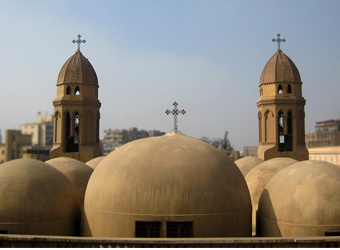A number of Christian clergymen and political commentators have welcomed the latest decision by Egypt’s Ministry of Housing to allow Christians to practice religious rites at unlicensed churches pending their formal recognition as places of worship.
A committee was formed in January 2017 by Prime Minister Sherif Ismail to review requests to formally recognise unlicensed churches.
The committee was formed in accordance with law no 80/2016, which eases restrictions on the building of churches.
The housing ministry’s decision came upon a request from Archpriest Michael Antoun, the Coptic Orthodox Church’s representative in the committee, according to a statement by the ministry.
Archpriest Antoun said that the Church has presented requests to formally recognise 2,600 churches and affiliated buildings in all Egyptian governorates by the end of September 2017.
Antoun said that the 2016 law allows religious rites to be practiced at unlicensed churches pending the legalisation of their status.
Karim Kamal, a Coptic political researcher and president of Copts for the Nation, described the ministry’s decision as a positive step towards implementing the 2016 law on building churches.
“The issue of unlicensed churches is not a problem from the state, governors, the ministry of interior or housing,” says Kamal, arguing that this is evident from the efforts by the Armed Forces to restore churches that were torched in the wake of the 30 June revolution in 2013.
“The real problem lies in the ultra-conservative Islamists in some villages in rural and Upper Egyptian governorates, who fuel tensions over small unlicensed churches to pressure security officials into closing these churches to prevent sectarian strife,” Kamal said.
Kamal also called on the state to enforce the rule of law and not to resort to mediating between parties to settle sectarian conflict.
Youssef Talaat, the legal representative of the Anglican Church in the committee, affirmed there are currently no Anglican churches that have been shuttered.
However, he expressed support for the Coptic Orthodox Church, which he says is the most affected by the closure of churches. Coptic Orthodox Christians make up 90 percent of all Christians in the country.
Catholic Archpriest of Giza Antonios Aziz also praised the Ministry of Housing’s decision, saying that it prevents the recurrence of sectarian incidents over unlicensed churches.
The ministry’s decision comes one month after a mob of Muslims stormed a building in Giza’s Atfih over a rumour that the premises would soon be officially recognised as a church. A number of Christians were injured in the incident.
In October 2016, four churches were closed in Upper Egypt’s Minya governorate following sectarian clashes over the premises being used as Christian places of worship without a licence. Christian officials and clergymen protested the decision to close the churches.
Before the church building law was passed in 2016, Christians – who make up an estimated 10 percent of the country’s nearly 100 million people – had long struggled to obtain permits to build churches, with the process at times taking years.
Source: Ahram online
